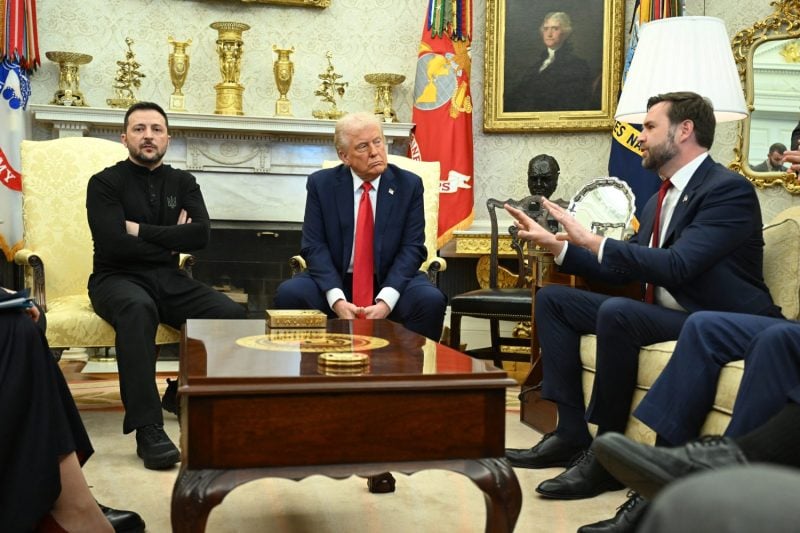Trump’s Russia-Ukraine Deal Will Be Null and Void

Trump’s Russia-Ukraine Deal Will Be Null and Void
International law nullifies any treaty coerced by force—like Moscow has deployed since 2014.
Ukrainian President Volodymyr Zelensky and U.S. President Donald Trump listen to U.S. Vice President J.D. Vance in the Oval Office of the White House in Washington on Feb. 28. Saul Loeb/AFP via Getty Images
The White House suggests that it is in the final stages of pushing for a Ukraine-Russia peace deal. And there are modest signs of progress, including a U.S.-Ukrainian agreement on mineral rights and reconstruction, as well as a meeting between U.S. President Donald Trump and Ukrainian President Volodymyr Zelensky in Rome that did not devolve into a shouting match.
But even assuming that Ukraine succumbs to U.S. pressure and reaches an agreement with Russia, all three states face a fundamental problem: International law will regard any peace treaty procured by force like Russia has deployed since 2014 as void. The remedy for this—U.N. Security Council approval of the agreement—warrants that institution playing a role sooner rather than later in the conflict’s outcome.
The White House suggests that it is in the final stages of pushing for a Ukraine-Russia peace deal. And there are modest signs of progress, including a U.S.-Ukrainian agreement on mineral rights and reconstruction, as well as a meeting between U.S. President Donald Trump and Ukrainian President Volodymyr Zelensky in Rome that did not devolve into a shouting match.
But even assuming that Ukraine succumbs to U.S. pressure and reaches an agreement with Russia, all three states face a fundamental problem: International law will regard any peace treaty procured by force like Russia has deployed since 2014 as void. The remedy for this—U.N. Security Council approval of the agreement—warrants that institution playing a role sooner rather than later in the conflict’s outcome.
The Vienna Convention on the Law of Treaties went into force in 1980 after three decades of drafting and ratification. Today, 116 states are bound by its terms, including Russia and Ukraine. The United States, while not a party, accepts most of its provisions as customary international law. Here’s the catch for Ukraine and Russia: Article 52 of the convention states, “A treaty is void if its conclusion has been procured by the threat or use of force in violation of the principles of international law embodied in the Charter of the United Nations.”
Prior to World War II, international law allowed states to go to war and coerce treaties as a result. The U.N. Charter, drafted under U.S. leadership, changed things fundamentally. It prohibits both the threat and the use of force, except in cases of self-defense or with U.N. Security Council authorization. The idea was to avoid future agreements like the infamous 1938 Munich Agreement where Britain, France, and Italy agreed to Nazi Germany’s annexation of Czechoslovakia’s Sudetenland. Thus, the experts who produced the first draft of the Vienna Convention saw what became Article 52 in simple and categorical terms: All treaties procured by threats or use of force breaching the charter are not simply voidable but void. The International Court of Justice has described Article 52 as customary international law, making it binding on all states.
Although Russian President Vladimir Putin, and more recently Trump, have suggested that Ukraine bears responsibility for the current conflict, that premise is simply untenable. Whether the conflict to be resolved started in 2014 with “green men” in Crimea or the full invasion of Ukraine in February 2022, Russia is in violation of the U.N. Charter. It has no viable claims to self-defense or Security Council approval. Indeed, the U.N. General Assembly concluded as much in March 2022. Even if Ukraine agreed to cede territories in an attempt to negotiate at least some favorable peace treaty provisions (such as security guarantees and the recognition of its right to pursue EU membership), that cannot salvage things. Any peace agreement that makes territorial or financial concessions to Russian interests must be viewed as procured by the force Russia has deployed, which makes it invalid.
Fans of realpolitik may wonder why the invalidity of a Ukrainian-Russian peace treaty matters so long as the parties accept it politically. And certainly, states increasingly rely on nonbinding agreements to deliberately skirt their rights and obligations under international law. The so-called Iran nuclear deal is a paradigmatic example: By not making it a formal treaty, the Obama administration avoided a hostile U.S. Senate approval process, which then allowed Trump’s first administration to walk away from the deal without triggering the right to any legal remedies for Iran and other participants. That deal’s very impermanence, however, highlights the risks of such an approach.
The treaty form has endured for millennia for a reason. Putting promises into a treaty signals to the parties and others a serious commitment that is absent in more ephemeral promises. If a Ukraine-Russia peace treaty is void before the ink is dry, neither side will have the legal ability to demand that the other conform to its terms. Neither can deploy sanctions or other countermeasures if the invalid treaty is breached. Instead of peace, this will create a dangerous instability; at any future point, Ukraine or Russia could simply claim that the deal was always void, creating ample room for opportunistic violations of its terms if either state sees an advantage in restarting the conflict. Third-party countries would also be free to decline to recognize the deal or to facilitate its observance.
There are two ways to avoid an invalid treaty. The first is based on self-defense. If the original victim of aggression repels the invasion and dictates terms to the original invader, that treaty is valid even though it is coerced. That possibility seems unlikely in Ukraine at present.
The other option is to allow the U.N. Security Council to ratify the deal under its authority to maintain international peace and security. It has done so in the past, including when it ended the war in Kosovo in 1999 and the fighting between Ethiopia and Eritrea in 2000. It could do so again here. That would mean the United States cannot go it alone in hammering out a peace deal. Instead, it needs to bring along a majority of Security Council members, including those who, like the United States and Russia, have a veto—namely, Britain, France, and China. Bringing in these countries will, however, likely mean accommodating additional peace terms that will be less favorable to Russia, strengthen Ukraine’s position, and give a number of key European voices their desired seats at the table.
The White House will no doubt want to ignore or resist the Vienna Convention’s rule voiding treaties generated by coercion. Trump’s second term is an apparent exercise in casting aside long-standing international commitments and institutions; it would be surprising if he did not do so here. But the obligations that the U.N. Charter and the law of treaties impose are not subject to the whim of a hegemon. The rule voiding coerced treaties exists precisely because all U.N. member states accepted a rule-of-law framework to avoid a world where might is always right.
U.S. Secretary of State Marco Rubio must recognize the problem coercion will pose for any future peace treaty between Russia and Ukraine, no matter the pressure the United States imposes to achieve it. He should aim to convince the White House that cooperation from the Security Council—now—is the best path forward. Greece holds the Security Council presidency for all of May and is thus well positioned to place the item on the council’s agenda. Involving the Security Council can, for one, help ensure a lasting peace between Ukraine and Russia that all countries will respect. But just as importantly, it can ensure that the result is a just peace—a deal the Security Council can certify comports with international law. At a time of rapid global change and increasing disorder, it is important that states signal that the rule of law—not aggressive wars—will continue, however imperfectly, to serve as the global order’s defining framework.
This post is part of FP’s ongoing coverage of the Trump administration. Follow along here.
Duncan B. Hollis is a law professor at Temple University and the editor of The Oxford Guide to Treaties.
More from Foreign Policy
-

Eight people dressed in camouflage military combat uniforms wade across a river, the water up to their waists. The soldiers carry large backpacks along with their rifles. Snowcapped mountains and a thick forest of evergreen trees loom in the distance. Get Ready for the Aleutian Island Crisis
As conflict heats up in the Arctic, foreign adversaries eye Alaskan territory.
-

U.S. President Donald Trump speaks to reporters before boarding Air Force One at Morristown Municipal Airport in Morristown, New Jersey, on April 27. Trump’s First 100 Days Reveal a ‘Strongman’s’ Unprecedented Weakness
No U.S. president has ever surrendered global power so quickly.
-

An elderly man and woman sit on the ground, the man on his knees as he sorts through something on the ground. Behind him are a rusted cart and bicycle in front of a paint-smeared concrete wall and a battered corrugated metal sign with the words USAID: From the American people” on it. What Trump’s New Budget Says About U.S. Foreign Policy
The president wants to significantly pull back on many of America’s traditional global engagements while spending more on the border and defense.
-

U.S. President Donald Trump listens to Secretary of State Marco Rubio at a cabinet meeting in the White House in Washington, D.C. Rubio’s Reorganization Plan Is a Wrecking Ball
The State Department revamp goes far beyond streamlining—it will devalue human rights and strip away critical expertise.










Join the Conversation
Commenting on this and other recent articles is just one benefit of a Foreign Policy subscription.
Already a subscriber?
.
Subscribe
Subscribe
View Comments
Join the Conversation
Join the conversation on this and other recent Foreign Policy articles when you subscribe now.
Subscribe
Subscribe
Not your account?
View Comments
Join the Conversation
Please follow our comment guidelines, stay on topic, and be civil, courteous, and respectful of others’ beliefs.
Change your username |
Log out
Change your username:
CANCEL
Confirm your username to get started.
The default username below has been generated using the first name and last initial on your FP subscriber account. Usernames may be updated at any time and must not contain inappropriate or offensive language.